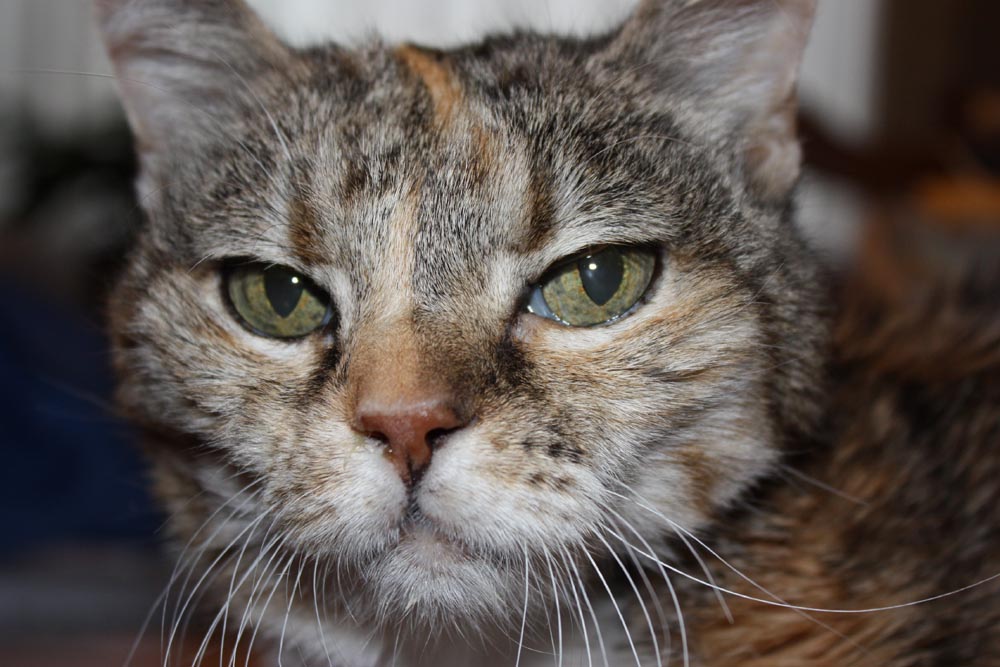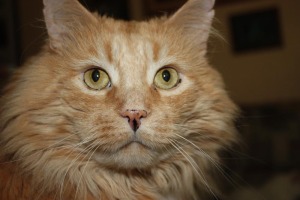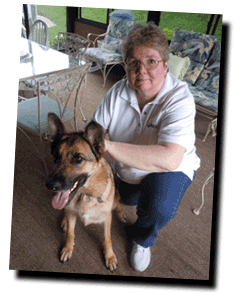Senior Pets Make Great Friends!

by Karen Sable, Guest Columnist
I have always had a soft spot in my heart for senior pets. When I visit a shelter or browse the listings on Petfinder, I certainly love the young puppies and kittens, but I am usually drawn to the senior pets. To me their eyes seem to reflect a wisdom, and what I call a “soulfulness”. Plus, I know that they are less likely to be adopted, and I have always been inclined to favor the “underdog”. Over the past twenty or so years, I have become the “mother” to ten cats. While some younger ones chose me by showing up in my yard and deciding they would move in, of those that I made a conscious decision to go and adopt, all were seniors.
Lacey, above, adopted me when she was around 9. She was an amazingly sweet cat who loved nothing more than to snooze on my lap. She was also very adept at opening the cupboard doors on her own, especially the one that stored the cat treats. Lacey passed away last year at age 14 after a courageous battle with lymphoma.
Colby, the orange Maine Coon below, is doing well and is now almost 12. I currently have 6 cats, and 5 of them are seniors!
Old or young, which to adopt?
There is probably nothing more adorable or irresistible than a young puppy or kitten. Who wouldn’t love those little balls of fur, so playful and cuddly? While a puppy or kitten can certainly make a terrific pet, they do require a good bit of work and patience. Trying to housebreak a puppy or train your kitten not to chew electrical cords or climb the drapes is not always an easy task.
For anyone who does not have the patience, or perhaps just the time, to properly train and socialize a young animal, a senior pet offers some definite advantages. November is “Senior Pet Adoption Month,” and that’s a great time to consider the benefits of adopting an older pet, and also to talk about a few of the things guardians of senior pets can do to give their furry family member as long and healthy a life as possible.
There are many benefits to adopting a senior pet:
Housetraining
A young puppy can require almost constant attention. While it is generally easier to litter train a kitten than to house break a puppy, even a kitten needs considerable attention to keep them safe, to properly socialize them, and to provide them with all of the playtime they want and need. Housebreaking a puppy can be quite an undertaking. In general, a puppy can only hold their bladder one hour for every month they’ve been alive. So, a two-month old puppy will need to empty its bladder every two hours, and that does include during the night when you want to sleep! A senior/adult dog or cat’s bladder on the other hand is fully developed, so they require less frequent trips to the bathroom.
Plus, senior pets adopted from a shelter or rescue group are almost always already fully housetrained or litter trained. Even for those who might not be, such as those adopted after being rescued from a puppy mill where they always just went to the bathroom in their cages, house-training an adult pet is generally easier in part because they have a much longer attention span than puppies or kittens.
Personality
The personality of a senior dog or cat is already fully developed, so generally what you see is what you get! Since senior pets have recognizable personality traits, you are better able to select a pet with the characteristics you are looking for. Shelters and rescue groups are better able to assess the personality of the senior pets they have for adoption, and can therefore better “match” you with the dog or cat that best fits your lifestyle.
Best Friend Forever

When you open your heart to a senior pet, they really do seem to show their appreciation by bonding very closely with you. Senior dogs and cats often end up at shelters a result of unfortunate circumstances or family tragedy. My most recent senior rescue, Colby, found himself in a shelter at age 9 after his owner passed away. Not only did his age make it less likely that he would be adopted, but he also had an upper respiratory infection, and a skin infection that I suspect was a reaction to a flea collar. Plus, he was a rather large cat- a 25 pound Maine Coon. But, one look in Colby’s eyes and I was smitten! He had the most soulful, loving eyes, and when I held him in my lap for the first time he was very calm and relaxed. Colby has turned out to be probably the most devoted and affectionate cat I have ever had. He definitely confirms what many have always said, that older pets seem to sense that you have truly rescued them, want only to please you, and are exceptionally loyal and affectionate.
Saving a Life
When you adopt a senior dog or cat, you very often are truly saving a life! The unfortunate reality is that puppies and kittens are usually the first to be adopted, while great senior pets are passed over. While we have made progress in reducing pet overpopulation and in moving towards a “no-kill” nation, the sad fact is that there are still some 4 million adoptable animals killed each year, and many of those are seniors who would have made terrific pets. Adopting a senior pet from a shelter or rescue group is truly an act of love, and one that gives you so much in return.
Giving your senior pet the best life
Adopting a senior pet certainly has definite advantages, but there are also some things that require a little extra attention to improve the chances of a longer, healthier life for your senior.
While it does vary a bit by breed and size, cats and dogs are generally considered “senior” at age seven. Since larger breed dogs tend to have shorter life spans than smaller breeds, they are usually considered “senior” at age 5 or 6. As with humans, some pets age more gracefully than others, and the advances in veterinary medicine have greatly improved the chances that our pets will live longer, healthier lives.
Still, as our pets enter their senior years, we do need to pay close attention to any physical or behavioral changes. For example, has your pet become more lethargic or more shy, or even more aggressive or dominant? Does he seem physically slower or less agile? Does he seem to withdraw more from interaction, or seem less interested in play? As pet parents, we know our furry family members better than anyone else, and we are therefore more likely to be the first to pick up on any changes in behavior or personality, even those that may be subtle. Any such changes should be discussed with your veterinarian.
In my last article I talked about the Snout-To-Tail Wellness Assessment. Learning and frequently performing this assessment on your senior pet is one of the best ways to help your pet live as long and healthy a life as possible. Not only is it a great opportunity for one-on-one bonding time with your pet, but it enables you to detect any changes or abnormalities. The assessment process itself enables you to touch and stroke your pet in a soothing manner, like a massage, and also allows you to detect any unusual lumps or bumps, any areas of sensitivity, pain, swelling or redness, any patchy or raw skin, any changes in breathing, etc. By bringing any such changes or abnormalities to your Vet’s attention, they are better able to diagnose any medical condition before it progresses and while it is more likely treatable.
What to expect with changes in health
Some changes are normal as our pets age. A senior pet may well slow down just as we do . However, their increased slowness could be due to the pain of arthritis, or even to hypothyroidism, both of which can respond very favorably to medication.
Reduced vision or hearing
Senior pets may also show signs of reduced vision or hearing. While they can still lead active lives with diminished vision or hearing, you will want to take some extra care to protect them from hazards. For example, when taking your senior dog for a walk, be sure to keep them on a leash at all times. Even simple things such as not moving furniture around in the house helps a pet with reduced vision, as they can still get around very well in a setting with which they are familiar. If you have other younger pets, or are considering introducing a new pet in a household with a senior pet, be sure to make a “safe place” available for your senior pet so that they can have a quiet, secure place when they need a “time out” from the younger animal.
Obesity
As with humans, obesity in senior pets puts them at increased risk for arthritis, high blood pressure, diabetes, respiratory difficulties, and even some cancers. Additionally, the early warning signs of some health problems may not be as apparent in an overweight pet. Taking steps to keep your senior pet at a healthy weight by providing them with the appropriate amounts of nutritional food is extremely important, as are regular visits to the Vet. Certainly any sudden weight gain or loss in an older pet should be promptly discussed with your vet, as that can be caused by anything from hypothyroidism to diabetes or even kidney disease.
Senior screening tests
Most vets now offer special “senior wellness programs” that include certain screening tests. By obtaining such baseline test results, and then repeating the tests on an ongoing basis, the vet is far more likely to detect any changes at the earliest possible stage. Taking advantage of such senior wellness programs from your vet, in combination with performing your own Snout-to-Tail Wellness Assessments, can greatly increase the likelihood that any medical condition can be detected early while it may be easily treated and before it can progress to something more serious.
Opening your heart to a senior pet can be one of the most rewarding things you do. I believe that their love and devotion is unmatched! While there may be some areas you will need to pay closer attention to in a senior pet, the same would be true for a young pet, though the issues may be different. Senior pets have so much to offer, but unfortunately they are too often passed over in favor of young puppies and kittens. If you are thinking about adding a pet to your family, I would strongly encourage you to consider adopting a senior pet. You truly will be their hero, and they will be your devoted friend for life!

About Karen Sable
Karen Sable, owner of Pet Emergency Training, LLC, completed the Pet Tech Instructor program in March, 2011 and teaches pet first aid classes in the Pittsburgh area. Karen is a trained responder with several national animal response/rescue teams, including American Humane’s Red Star Animal Emergency Services Team, United Animal Nations’ Emergency Animal Rescue Service, and Noah’s Wish Disaster Response Team. She is also a member of the PA/Allegheny County Animal Response Team, and a volunteer animal rescue transporter.
In addition to having a Veterinary Assistant diploma, Karen’s training certifications include Emergency Animal Sheltering, Large Animal Rescue, Animals in Disaster, Livestock in Disaster, Hazardous Materials, Incident Command and National Incident Management. As a former healthcare Human Resources Director, Karen now devotes her extensive training experience, and love of animals, to teaching pet care professionals and fellow pet parents the skills and knowledge that can save their pets and improve the quality of their pets’ lives. Visit her website at Pet Emergency Training, LLC.
An article by Karen on a timely pet first aid, wellness or disaster rescue topic will appear on The Creative Cat on the first Friday of every month.
October 2011: Help Your Pets to Stay Well
October 2011: The Snout-to-Tail Wellness Assessment
September 2011: Are Your Pets Prepared For An Emergency ?
Read more about Karen in The Creative Cat Welcomes Guest Columnist Karen Sable.


Pingback: Winter Pet Safety « The Creative Cat
Wonderful article! Hubby and I wouldn’t even consider a young cat now – we are completely in love with our Oldies. Our local animal charity knows that any cruelty cases or oldies come to us for the rest of their days – we currently have four! Thomas & Misty are 15, Nina is an epileptic 10yo and Lily, although young at 4yo, came to us in August 2011 with a shattered front leg after a car accident and has spent the last four months recovering. The first three were dumped at the sanctuary because of their age and health ‘problems’ (though all are perfectly healthy now!) and we’ve never been able to trace Lily’s previous home. They all have their own individual personalities and we really couldn’t be without them. As hubby says, fostering the oldies feels like the first worthwhile thing we have ever done in our lives!
We cannot recommend older animals enough to everyone we meet – they may not be with you as long as a kitten or puppy will but what they give, even if only for a few months or years, is more than made up with their devotion and character.
Welcome Gillian and hubby, and thanks for taking care of those seniors! Especially the ones with special needs; they don’t require too much, and yet they can be intimidating to most people. Most of the cats I’ve rescued through the years were adults, usually middle-aged, but my oldest was Peaches and her sister Cream at age 15. I lost Cream soon after but Peaches lived to be 20 and you can read all about her here. We hear so many sad stories about animals but I love to hear a happy ending!
Pingback: Holiday Pet Safety « The Creative Cat
Great post Karen and such good advice. Clearly, all animals deserve a loving home, but there really are so many senior cats that may never see a warm home and comfortable lap to nap on as they are passed over by folks looking for a younger cat or kitten. It truly breaks my heart. I completely agree with all that you said and I hope that your advice will be taken under serious consideration and that senior adoption rates will go up.
Big Bad Baby Twinkle, who has been the DESPOTIK RULER in my humble abode for over 15 years, agrees. So does Sweet Cee Cee, found in a vacant (well there WERE 18 cats on it, all of whom were rescued) and who is now 12 (or more – exact age unknown) would also nod her frowzy heddie in agreement.
It GALLS me and HURTS MY HEART when I see elderly animals, some of whom were owned since they were babies- dumped in a shelter or abandoned. Tell me– have the HUMANS who owned these cats not aged in those 10, 15, 17 or more years???? A pet IS for life, and until there is mandatory Humane Education in all the schools from K-12 — this stuff will continue to happen and SO MANY elderly pets will suffer and possibly die unloved and alone, or in a gas chamber or at the end of a needle– because of Man”KIND”‘s unkindnesses to them.
Whatever Big Bad Baby Twinkle sez, I’d do it!
What hurts even more is that often they end up there because their elderly humans either could not take care of them or went to the rainbow before them–and the ungrateful children of said humans didn’t want anything to do with their beloved pets! A double indignity to human and animal, after loving and protecting all those years to end up like that.